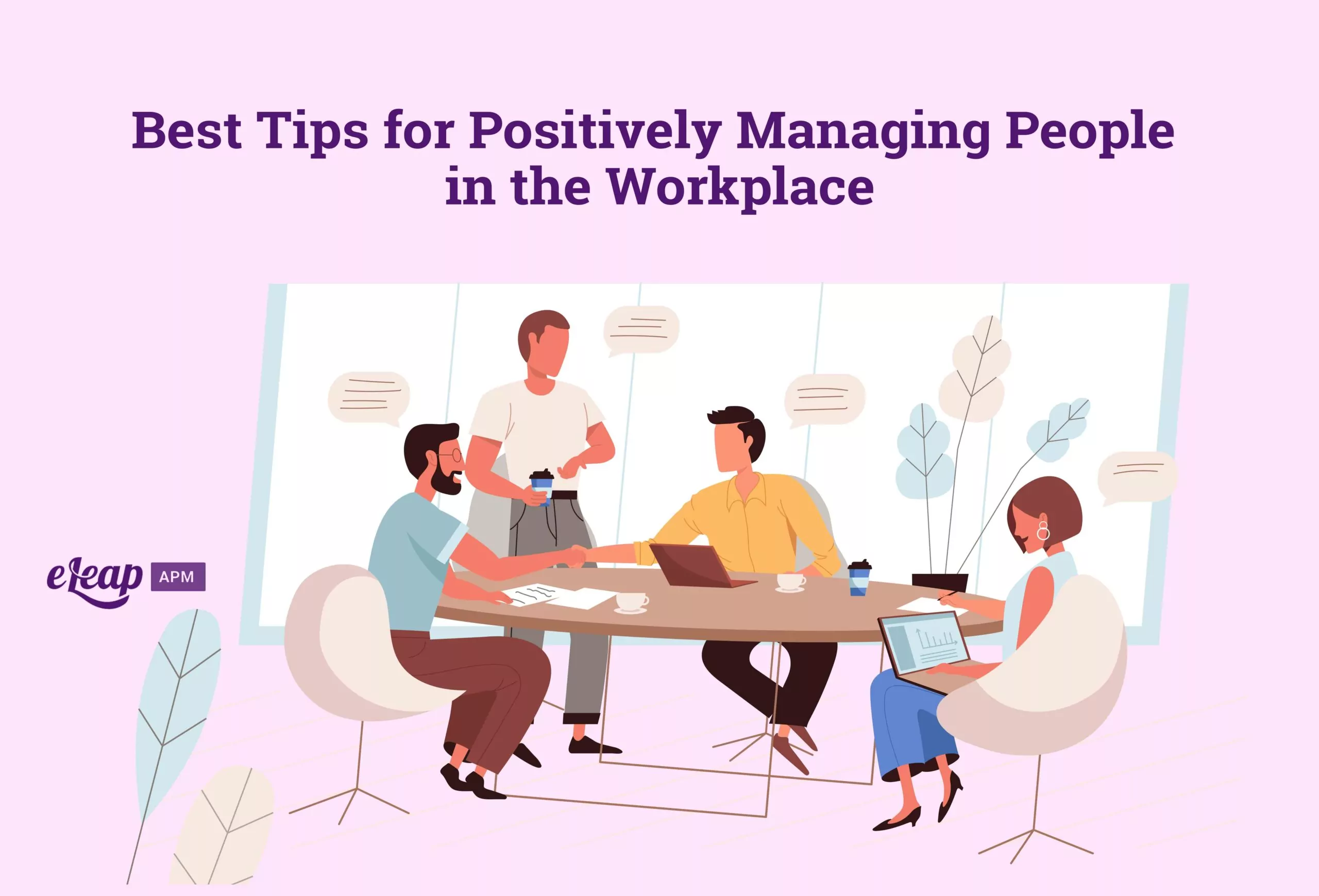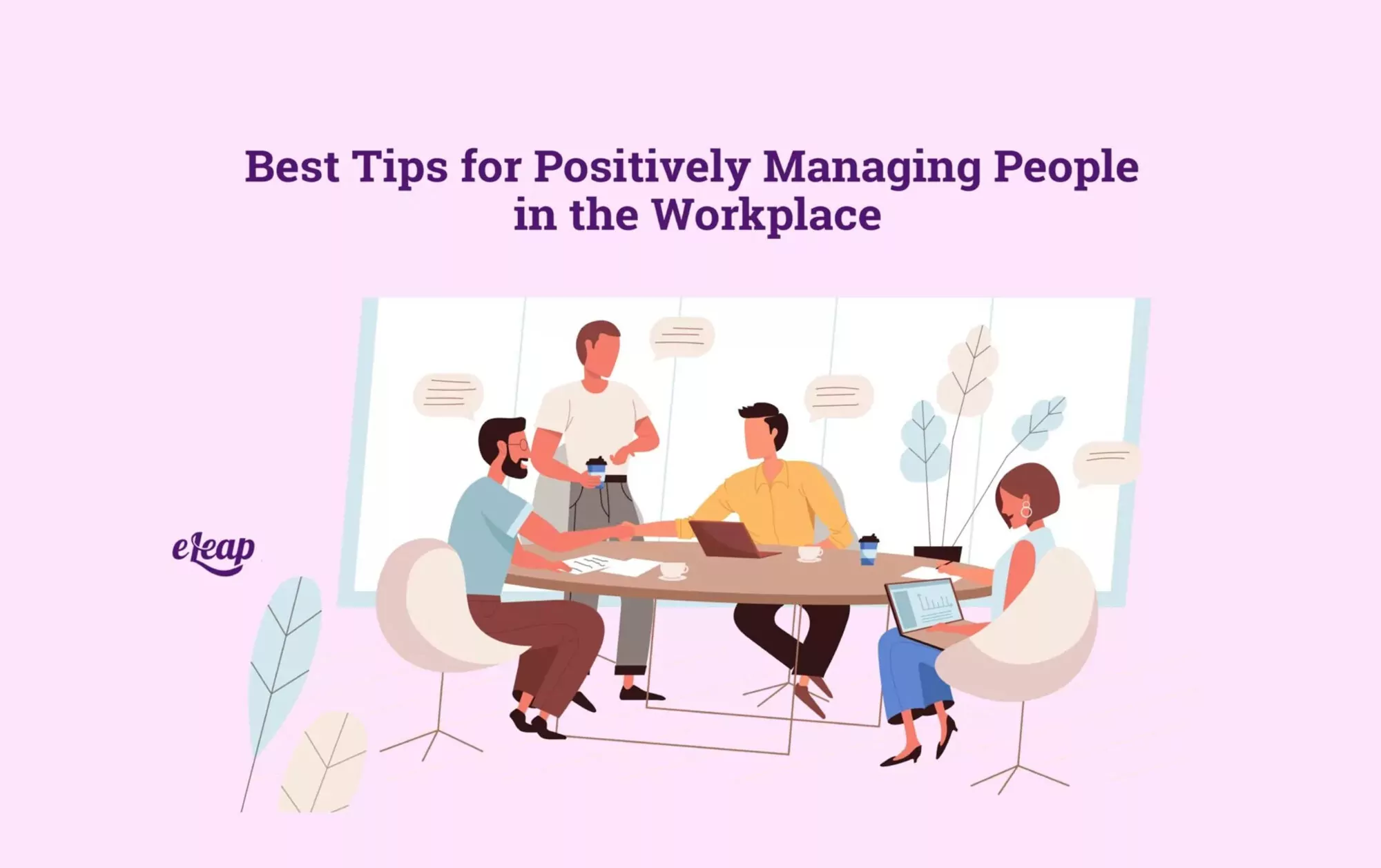Best Tips for Positively Managing People in the Workplace

No matter your place on the company ladder, it’s important to manage people well and work positively with others. This includes communicating effectively, sharing and delegating responsibilities, working efficiently, and offering feedback with an assertive yet gracious attitude. These skills become even more important when you are in a management position. People look to you as a role model in the business, so you should want to continuously become a better people manager.

What does it really mean to manage people? This umbrella term encompasses the development, problem-solving, organization, and growth of employees. Concrete skills range from creating efficient teams and helping manage peer-to-peer conflict to developing efficient performance management strategies and analyzing employee retention rates.
When you manage people, your focus is on a different area than improving employees’ actual job performance. Here, you concentrate on their morale, welfare, and well-being. You want to enable your team to think critically, use creativity to find solutions and work efficiently together to increase company success.
Managers are a critical part of the business hierarchy. Employees can’t be expected to perform their jobs well if they are also asked to create the company’s structure. Likewise, they shouldn’t be expected to be in charge of managing their problems and developments without assistance.
The odds are that some of these areas are where you already excel, and others you will look at and immediately know that they are where you have room to grow. Read these tips with an open mind; there is space for improvement in everyone in every area, and you only stand to gain happier employees and a better-connected team, which will benefit your business immediately.
Listening Skills Are Foundational
You probably know hearing someone is critically different from actively listening to them. We have all spent our entire lives communicating with others, but truly listening is surprisingly difficult for many people.
When you are a good listener, your attention is focused on the other person, not distracted by other thoughts or tasks. You make eye contact, show receptive body language, and ask questions, showing you care about the information. You might even take notes to reflect and process the information later if that helps you operate better.
One of the most important skills when actively listening to another person is waiting for them to finish speaking before you begin and quieting your thoughts while they are talking. When you simply wait for them to finish so that you can jump in with your own (often differing opinions), this reduces your capacity to truly hear what they are saying and read deeper into the conversation.
Business Problems Aren’t the Same as People Problems
It’s impossible to have a workplace or an employment team without enduring some sort of conflict. Conflict can often be a catalyst for positive change. However, remember that organizational problems should be handled differently than personal issues.
Examples of Personal Problems
Employees might often present with personal problems that, when ignored, can manifest as larger ones or become organizational issues. Some common personal workplace problems include:
- Heavy workloads
- Inefficient task management
- Dissatisfaction with peer partners
- Boredom or lack of motivation
Personal problems are easily addressed by managing people. Even though each person’s issue comes with a unique situation and need, you can use the skills you learn to understand better how to approach a similar problem next time it arises.
Examples of Organizational Problems
Conflict at the organizational level almost always takes more time and resources to solve than simply working one-on-one with someone with a personal problem. These are often entrenched in company policy or procedure, but the positive to this is that when an issue is solved, it brings about huge gains. Organizational problems are situations such as:
- Teams that are too small or large to handle workloads effectively
- Workflow jams that cause delays or errors
- Overall poor performance or toxic culture that creates a hostile work environment
- No employee control over their projects or momentum
Recognizing the difference between these two types of problems gives you the know-how to solve the conflict through your people management skills or to reach out to your upper chain of command for assistance in altering the company’s operations.
The Importance of Purpose
Every team member should know their role within the company. They also have a deeper purpose—why they come to work every day and, hopefully, some sense of joy from their work. As the manager, your responsibility is to know each person’s purpose so that you can understand their position and treat them with empathy and encouragement while you address any issues that come up. This understanding creates space for people to continue pushing for improvement and success.
People inherently want to succeed and want to be allowed to show off their strengths. When you spend time connecting with your employees and understanding them as individuals with unique experiences, opinions, and knowledge, you will be better able to tailor their work and projects to keep them connected and engaged.
Balancing Praise and Constructive Criticism
A manager’s job definitely isn’t all sunshine and roses, that’s for sure. Of course, it’s an enjoyable part of the job to be able to praise people and share good feelings of success. Giving feedback on poor performance or the need for change can often be stressful. However, this stress can be lessened when appropriately matched with positive feedback.
Think about it as a scale, but one on which criticism is a bit heavier than praise. People remember negative interactions and critiques for much longer than they remember compliments. So, if you want to keep the scales even, you’ll need to give about five positive “atta kids” for each criticism.
Remember that both praise and critiques cause growth but in different ways. You don’t want to be seen as a manager who only wants to please and thus loses the chance to help people develop. However, no one wants a boss whom they have to walk on eggshells around and who is impossible to please.
Keep Lines of Communication Open
Telling your employees that you have an open-door policy might seem a bit cliché. Instead of saying it, though, show it. You could literally keep your door open if the outside distractions don’t bother you. But you could also show that you are always there to listen by asking open-ended questions, remembering small details from your conversations, and ensuring that your body language is inviting and affirming.
During stressful situations such as performance reviews, start and end with positives and sandwich critiques in between. Ask your employees simple yet encouraging questions such as, “What else would you like to discuss?” or “If you could see anything changed, what would it be?”
Communicating in this way builds trust. Trust in business relationships means people are willing to take risks, ask for guidance, and help each other. When these are present in the workplace culture (and a manager does create the culture), everyone benefits.
Be Available When Things Are Difficult… and When They’re Going Well
Managers are often seen as the people in the office who deal with all the problems. That’s your job, of course, but it’s also your job to affirm, recognize success, and continue people on the path toward purposeful employment.
This is a place where managing people from a place of trust is also important. If an employee has a difficult or pressing issue that requires a great deal of help from the upper hierarchy to solve, they might not feel comfortable coming to you because they don’t feel a connection. They might not know how to approach you or will worry about how you will react.
However, if you have created a relationship from the beginning, helping people solve their problems will be much easier. Consider biweekly or monthly meetings with your employees to touch base and connect about anything happening in the office or their lives affecting their work. This isn’t wasted time—it’s an investment in your employees and a way to learn about managing people in all situations.
Prioritize Managing People—It’s Worth Your Time
Think of people management as a journey instead of a destination. Even the most seasoned managers should still take constructive feedback from their peers and employees to improve. There is always a new employee with a unique personality or a yet-to-be-seen situation requiring creative solutions around the corner. Managers who are complacent and okay with staying stagnant will not foster a community of engagement and growth. Those who know they are responsible for growing and improving just as they expect their employees. They need to set themselves up for success with a business that has the capabilities to succeed no matter what comes up.